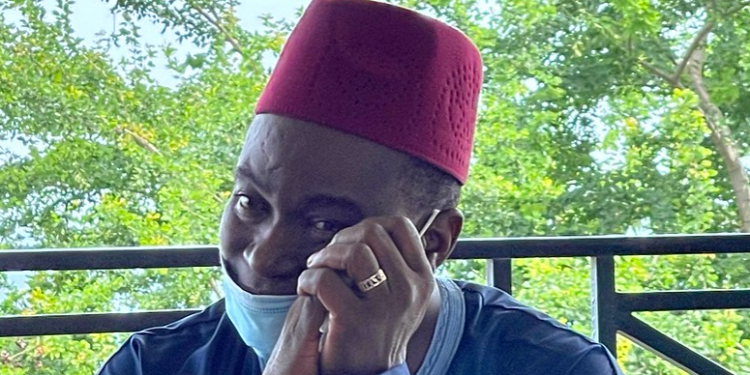By Mackie M. Jalloh
The All People’s Congress (APC) finds itself embroiled in a widening internal rift, with members of the party’s Strategic Communications Unit accusing Dr. Samura Kamara, their former presidential candidate, of fostering divisions. The accusations follow Kamara’s refusal to hand over office keys at the APC’s headquarters in Brookfields, Freetown—a standoff that has not only escalated tensions within the party but has also cast doubt on its unity and readiness for the 2028 elections.
The conflict traces back to a formal request made by APC Secretary General Lansana Dumbuya approximately two weeks ago. In his letter, Dumbuya urged Kamara to return the keys to his office, emphasizing that his tenure effectively ended with his defeat in the 2023 elections, where he lost to the incumbent, Julius Maada Bio. Dumbuya’s letter pointed out that Kamara had previously committed to vacating the premises following the recommendations of the Tripartite Committee, a group formed to address internal party issues and ensure smoother leadership transitions. However, Kamara’s continued occupancy of the office has prompted concerns among party officials, who view it as an obstruction to the leadership’s efforts to restructure and unify the APC.
Dr. Kamara, in response, has publicly justified his decision to retain the office keys, arguing that his actions stem from a genuine desire to address broader issues of electoral justice. He expressed discontent with the current APC leadership’s focus on administrative and logistical matters, such as office access, which he considers trivial. According to Kamara, these issues detract from the party’s ultimate goals of unity and strength. He has also suggested that his decision to retain the office is symbolic of his ongoing fight for fairness and transparency in Sierra Leone’s electoral process—a cause he believes is essential to the APC’s credibility.
The APC leadership, however, interprets Kamara’s actions differently. In a lengthy essay circulated widely on social media, the party’s Strategic Communications Unit accused Kamara of “prioritizing personal grievances over the party’s collective mission.” They expressed concern that Kamara’s actions might inadvertently play into the ruling Sierra Leone People’s Party’s (SLPP) hands by sowing discord within the APC, ultimately weakening its strategy for future elections. The statement from the APC’s communications team emphasized the belief that unity and clear, organized leadership are essential as the party rebuilds in preparation for the 2028 elections. “Samura Kamara’s recent behavior not only undermines our leadership structure but also jeopardizes our shared commitment to a strong, united APC,” the statement read.
Adding to the complexity of the situation is Kamara’s strong grassroots support. Despite his recent actions, many of Kamara’s loyal followers still view him as a crucial figure within the APC, one who has consistently championed the interests of the party’s base. However, party leaders argue that his reluctance to relinquish the office has eroded some of this trust, particularly among those who initially looked to him for guidance in rebuilding the APC after the last election. They contend that his refusal to comply with party directives reflects an unwillingness to support the leadership’s vision for a stronger, more cohesive organization.
The controversy has sparked mixed reactions within the APC’s ranks, with some members expressing concern that the internal conflict may hinder the party’s electoral prospects. A long-time supporter of the APC confided that this level of discord, if left unresolved, could lead to a party crisis with severe consequences in 2028. “If this dispute isn’t settled soon, it could tear the party apart,” the supporter remarked. “We need all hands on deck to challenge the SLPP, and this division only weakens our cause.”
The party’s leadership is now faced with a delicate task: finding a path to reconciliation without alienating Kamara’s supporters. Some high-ranking members within the APC are calling for urgent mediation efforts, hoping that a neutral intervention could bridge the widening gap between Kamara and the current leadership. In their view, addressing the root causes of the conflict is essential to preventing long-term fragmentation.
Political analysts watching the situation unfold have noted that the dispute raises questions about the APC’s direction and organizational stability. According to one observer, the conflict underscores a broader struggle within the APC to redefine its identity following multiple electoral setbacks. “The APC must confront its internal divisions if it hopes to be a viable contender in 2028,” the analyst commented. “Without a unified front, the party’s message and strategic focus may continue to be diluted.”
As the APC grapples with these challenges, the future of the party’s leadership dynamics remains uncertain. For now, Dr. Samura Kamara remains adamant about his position, and the party leadership remains firm in its stance that the keys be returned, signaling a stalemate that could either escalate or find resolution through compromise.
In a time when unity is crucial for the APC’s prospects, both sides may need to consider reconciliation strategies that honor Kamara’s contributions while respecting the leadership’s vision for moving forward. Without a swift resolution, the APC risks deepening its internal fractures, potentially jeopardizing its capacity to mount a credible opposition in the years ahead.













